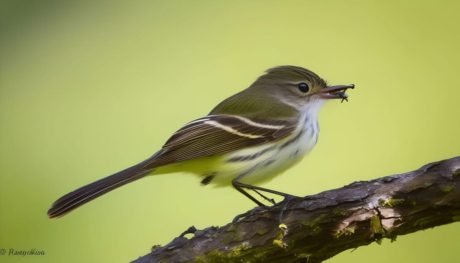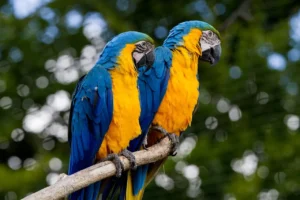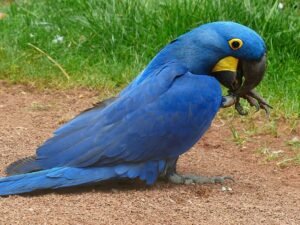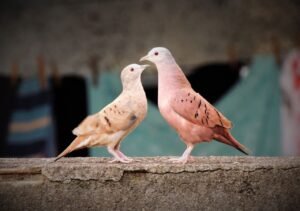Macaws | Bird Species, 27 Types, Prices, Care Tips, Facts, Health Issues
Macaws are a stunning and intelligent species of parrots known for their vibrant plumage and lively personalities. These captivating birds make exceptional companions for those who can meet their unique care requirements. Whether you’re considering Macaw ownership or simply want to learn more about these colorful creatures, explore our guide for essential insights into their world.
Macaw
The macaw is a stunning and charismatic bird that belongs to the parrot family (Psittacidae), known for its vibrant plumage, intelligent nature, and engaging personality. These majestic birds are native to the tropical rainforests of Central and South America, and they have captivated people around the world with their striking beauty and captivating behavior.
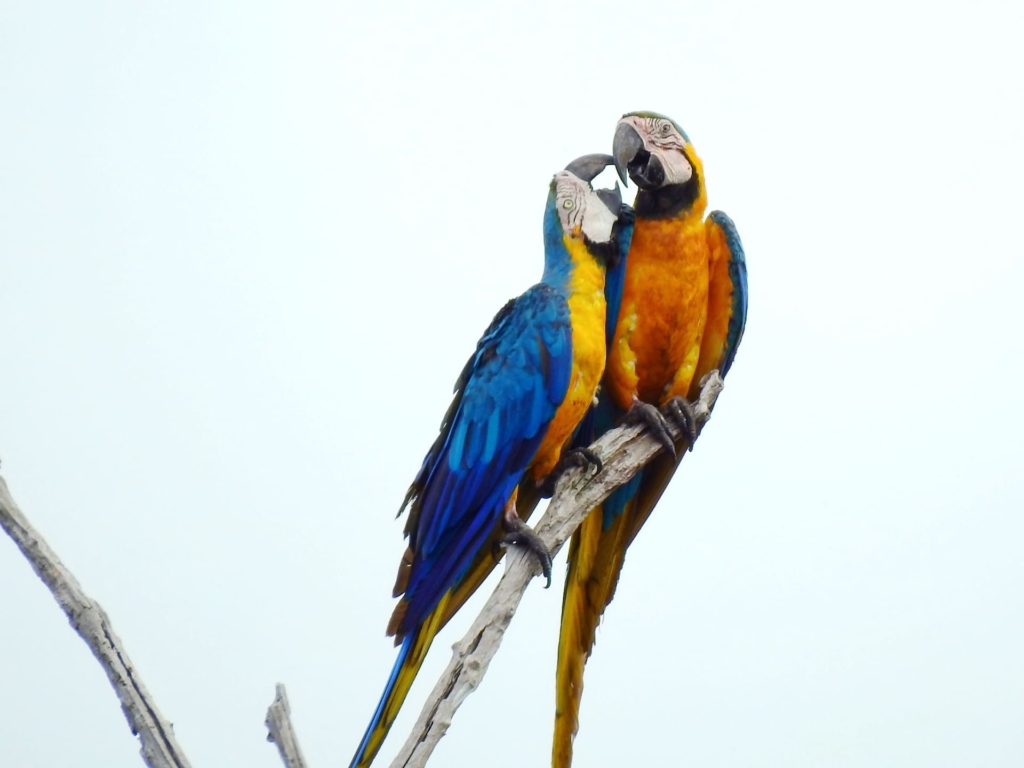
One of the most remarkable features of macaws is their vibrant and diverse plumage. Their feathers come in a stunning array of colors, including brilliant blues, vivid yellows, vibrant reds, and vibrant greens. These striking colors not only serve as a form of camouflage in their lush forest habitats but also play a crucial role in communication and attracting mates. Their vivid plumage and graceful flight make them some of the most visually captivating birds in the avian world.
Macaws are large birds, with some species reaching lengths of up to 40 inches (1 meter) or more. Their powerful beaks are adapted for cracking open tough nuts and seeds, which form a significant part of their diet. However, macaws are not strictly herbivores; they also consume fruits, berries, and even the occasional insect or small vertebrate.
These birds are highly social and often form tight-knit family groups. Their intelligence and ability to mimic sounds and human speech have made them popular pets, but they require a great deal of attention and social interaction. In their natural habitat, macaws communicate with one another through a combination of vocalizations, body language, and colorful displays. These displays often involve spreading their wings and tail feathers, which can create breathtaking visual spectacles.

Macaws are also known for their long lifespan, with some individuals living for up to 60 years or more in captivity. In the wild, their lifespan is generally shorter due to various natural threats and habitat challenges, including deforestation and illegal wildlife trade. Conservation efforts are crucial to protect these magnificent birds and their fragile ecosystems.
Macaw Characteristics and Information:
Key characteristics and information about macaws:
| Characteristic | Information |
|---|---|
| Scientific Classification | Family: Psittacidae |
| Habitat | Tropical rainforests of Central and South America |
| Size | Large, up to 40 inches (1 meter) or more |
| Plumage Colors | Vibrant blues, yellows, reds, and greens |
| Beak | Powerful, adapted for cracking nuts and seeds |
| Diet | Nuts, seeds, fruits, berries, insects, small vertebrates |
| Social Behavior | Highly social, often forming family groups |
| Lifespan | Up to 60 years or more in captivity |
| Threats | Habitat loss, illegal pet trade, poaching for feathers |
| Conservation Status | Many species are endangered or threatened |
| Notable Species | Scarlet Macaw, Blue-and-Gold Macaw, Hyacinth Macaw |
Macaw Vs Parrot
Comparision and key differences between Macaw Vs Parrot:
| Characteristic | Macaw | Parrot |
|---|---|---|
| Family | Psittacidae | Psittacidae |
| Size | Larger, often over 30 inches (76 cm) | Varies, can range from small to large |
| Plumage | Bright and vibrant colors | Diverse range of colors and patterns |
| Range | Native to Central and South America | Found in various regions worldwide |
| Species Diversity | Approximately 18 species | Over 393 species (diverse) |
| Lifespan | 50 to 75 years (depending on species) | 15 to 80 years (depending on species) |
| Vocalization | Loud and distinctive calls | Varied vocalizations, can mimic sounds |
| Diet | Fruits, nuts, seeds, and vegetation | Omnivorous, diet includes seeds, fruits, insects, and more |
| Social Behavior | Often found in pairs or small groups | Varies by species, some are social, while others are solitary |
| Conservation Status | Some species are endangered or threatened | Varied conservation statuses |
| Notable Species | Blue-and-gold Macaw, Scarlet Macaw | African Grey Parrot, Amazon Parrot |
History of Macaw Birds
Macaws have a rich history that dates back centuries. These colorful parrots are native to Central and South America and have been admired and revered by indigenous peoples for their vibrant plumage. They have been depicted in ancient artworks and have played significant cultural roles in various indigenous communities. With the arrival of European explorers and settlers in the Americas, macaws became sought-after commodities in the pet trade.
Appearance of Macaw Birds
Macaws are known for their striking appearance. They typically have large bodies with long tails and vibrant plumage. Their feathers come in a variety of colors, including blue, red, green, yellow, and combinations thereof. Macaws also have strong, hooked beaks that are adapted for cracking open nuts and seeds. Their feet are zygodactyl, meaning two toes point forward and two point backward, allowing them to grasp onto branches and objects with ease.
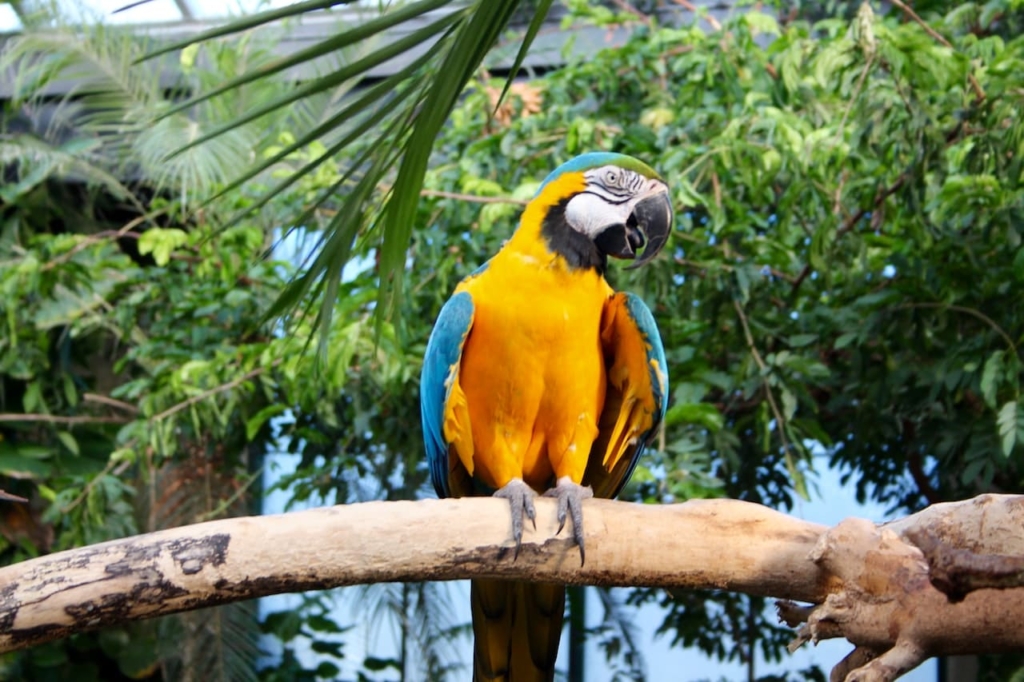
Suitable Temperature for Macaw Birds
As we already discussed the temperature of Each state of India that is Suitable for Macaw Birds but, Between 65 and 85 °F (18 and 29 °C) is the ideal temperature range for macaw birds. Extreme heat and abrupt temperature swings should be avoided because they might stress birds and harm their health.
Behaviour of Macaw
Macaws are highly active birds known for their playful behavior. They enjoy climbing, flying, and exploring their surroundings. In the wild, they often live in flocks and communicate with loud calls. Their vocalizations serve various purposes, including establishing territory and communicating with other macaws.
Macaw Scientific Name
The scientific name for the macaw family is “Psittacidae.” Within this family, there are various macaw species, each with its own scientific name. For example, the Hyacinth Macaw’s scientific name is “Anodorhynchus hyacinthinus.”
Macaw Pronunciation
The word “macaw” is typically pronounced as “muh-kaw.” The emphasis is placed on the first syllable, “muh,” and the second syllable, “kaw,” is pronounced with a short “a” sound, similar to the word “saw.”
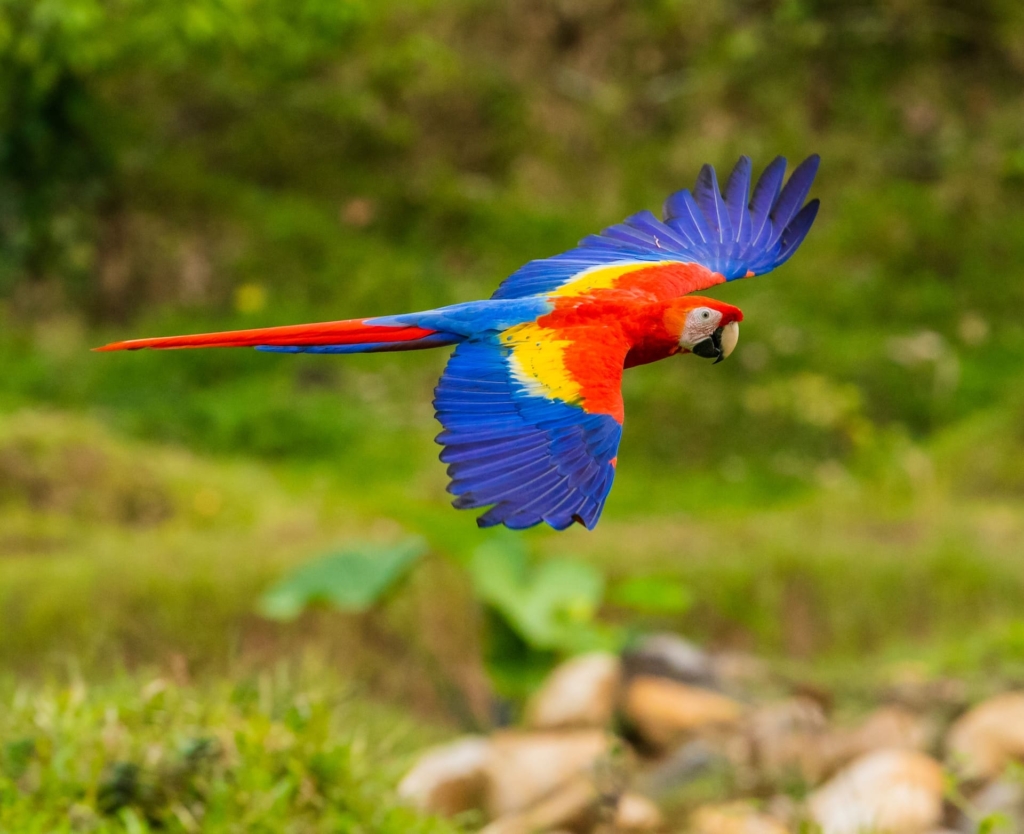
Hyacinth Macaw Pronunciation
The Hyacinth Macaw is pronounced as “hahy-uh-sinth muh-kaw.” The first syllable, “hahy,” has a long “i” sound, and the second syllable, “uh,” is pronounced with a short “a” sound. The word “sinth” is pronounced with a soft “s,” similar to “sin,” and the emphasis is placed on the second syllable, “sinth.”
Macaw Meaning
The term “macaw” refers to a group of large, colorful parrots native to Central and South America. The word “macaw” is believed to have originated from the Portuguese word “mbaracu,” which means “large parrot.”
Macaw Meaning In Hindi
In Hindi, “Macaw” can be referred to as “मैकॉ” (pronounced as “maiko”). Macaws, often referred to as “मैकॉ” in Hindi, are large and colorful parrots native to Central and South America. They are known for their striking appearance and vibrant plumage, making them a subject of fascination among bird enthusiasts.
Macaw Meaning In Marathi
In Marathi, “Macaw” can be referred to as “मॅकॉ” (pronounced as “maiko”). These remarkable birds, known as “मॅकॉ” in Marathi, are renowned for their colorful feathers and social nature. They are often admired for their beauty and playfulness and are sometimes kept as pets.
Macaw Meaning In Tamil
In Tamil, “Macaw” can be referred to as “மைகா” (pronounced as “maika”). “மைகா” அல்லது மெக்காவு” (Macaw or Mekkavu) என்பது கெந்த்திரப் பசிபூர் தேசத்தில் காணப்படும் பர்ராகளின் ஒரு வகையாகும். அவர்கள் அவர்கள் விரல்களையும் மற்றும் பறக்களையும் வசிக்கும் குறியீட்டு மணிகளையும் கொண்டிருக்கும்.
Macaw Habitat
Macaws are primarily found in tropical rainforests, savannas, and woodlands in Central and South America. They are highly adaptable and can thrive in various habitats, but they are most commonly associated with lush rainforests.
Macaw Typical Habitat
The typical habitat of macaws includes dense rainforests, where they find an abundance of fruits, nuts, and seeds. They are also often found near rivers and swamps, where water sources are readily available.
Macaws In The Rainforest
Macaws play a vital role in the rainforest ecosystem by dispersing seeds through their diet and flight patterns. They help in maintaining the health and diversity of the rainforest by contributing to seed dispersal and forest regeneration.
Glaucous Macaw Conservation Status
The Glaucous Macaw (Anodorhynchus glaucus) is critically endangered and is considered one of the rarest macaw species. Efforts to conserve this species focus on protecting its remaining habitat and breeding programs in captivity.
Lear’s Macaw Conservation Status
Lear’s Macaw (Anodorhynchus leari) is also critically endangered due to habitat loss and illegal trapping. Conservation initiatives include safeguarding nesting sites and habitat restoration to prevent the decline of this striking macaw.
Are Macaws Endangered

Many macaw species are indeed endangered. Habitat destruction, illegal pet trade, and other human activities have placed several macaw species at risk. Conservation efforts, such as habitat protection, breeding programs, and stricter regulations on the pet trade, are crucial to the survival of these magnificent birds.
27 Types of Macaw Birds
There are mainly 27 Types of Macaw Parrots on the basis of their behaviour, and different Characteristics. All of them are described below:
1. Hyacinth Macaw

The Hyacinth Macaw (Anodorhynchus hyacinthinus) is often referred to as the “gentle giant” of the macaw family due to its impressive size and striking appearance. With its vibrant cobalt-blue plumage, this magnificent bird is the largest of all parrots, reaching lengths of up to 40 inches (1 meter) from beak to tail.
Native to the Amazon rainforest and parts of South America, it is also known for its powerful beak adapted for cracking open hard nuts and seeds. The Hyacinth Macaw’s diet mainly consists of palm nuts, which it expertly manipulates with its strong beak.
These macaws are highly intelligent and form strong social bonds, often living in family groups. Their vibrant blue feathers and playful behavior make them a favorite among bird enthusiasts, both in their natural habitat and as pets. Unfortunately, they are listed as vulnerable due to habitat destruction and illegal pet trade, making conservation efforts critical to their survival.
2. Scarlet Macaw
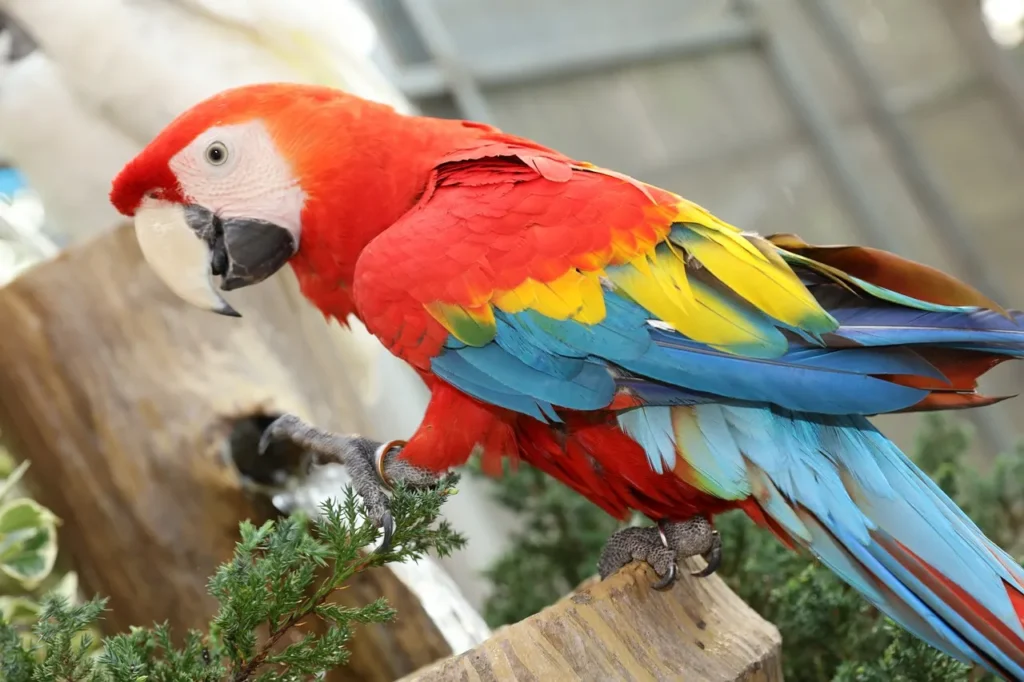
The Scarlet Macaw (Ara macao) is a vibrant and iconic member of the macaw family, known for its stunning scarlet-red plumage adorned with vivid blue and yellow accents on its wings. Native to the tropical rainforests of Central and South America, particularly in countries like Brazil and Peru, these birds are prized for their intelligence and striking appearance. They are also renowned for their ability to mimic sounds, including human speech.
Scarlet Macaws play a crucial role in their ecosystem by dispersing seeds through their diet and flight patterns. They are highly social birds, often seen in pairs or small groups, and their loud calls are a characteristic sound of the rainforest. While they are still relatively abundant in some regions, habitat loss and illegal pet trade have led to conservation concerns for this species.
3. Spix Macaw

The Spix’s Macaw (Cyanopsitta spixii), also known as the Little Blue Macaw, is one of the rarest and most endangered birds globally. Its striking blue plumage and small stature have made it a symbol of conservation efforts. Native to Brazil, particularly the state of Bahia, the Spix’s Macaw was believed to be extinct in the wild until a few individuals were rediscovered in the early 2000s.
Efforts are underway to conserve and breed this critically endangered species in captivity to eventually reintroduce it to its native habitat. The Spix’s Macaw gained international attention through the animated movie “Rio,” which highlighted the importance of preserving this remarkable bird.
4. Cuban Macaw

The Cuban Macaw (Ara tricolor) is a macaw species that tragically became extinct in the late 19th century. Once native to Cuba and the Isle of Pines, it was characterized by its striking plumage of red, green, and white. The primary reasons for its extinction were habitat loss and hunting for its colorful feathers.
Despite its extinction, the Cuban Macaw remains a symbol of the importance of conservation and the need to protect the remaining macaw species. Efforts to prevent similar tragedies in the future include conservation programs and strict regulations on the pet trade.
5. Lutino Macaw

Lutino Macaws are not a distinct species but rather a result of a genetic mutation that affects various macaw species. These birds are known for their bright yellow plumage and striking appearance. Lutino Macaws are popular among macaw enthusiasts for their unique coloration, and they are often kept as pets.
Their charming personalities and striking yellow feathers make them a favorite among those who appreciate the beauty and companionship of macaws. While they are not a separate species, they contribute to the diversity of macaw colorations found in the pet trade.
6. Albino Macaw
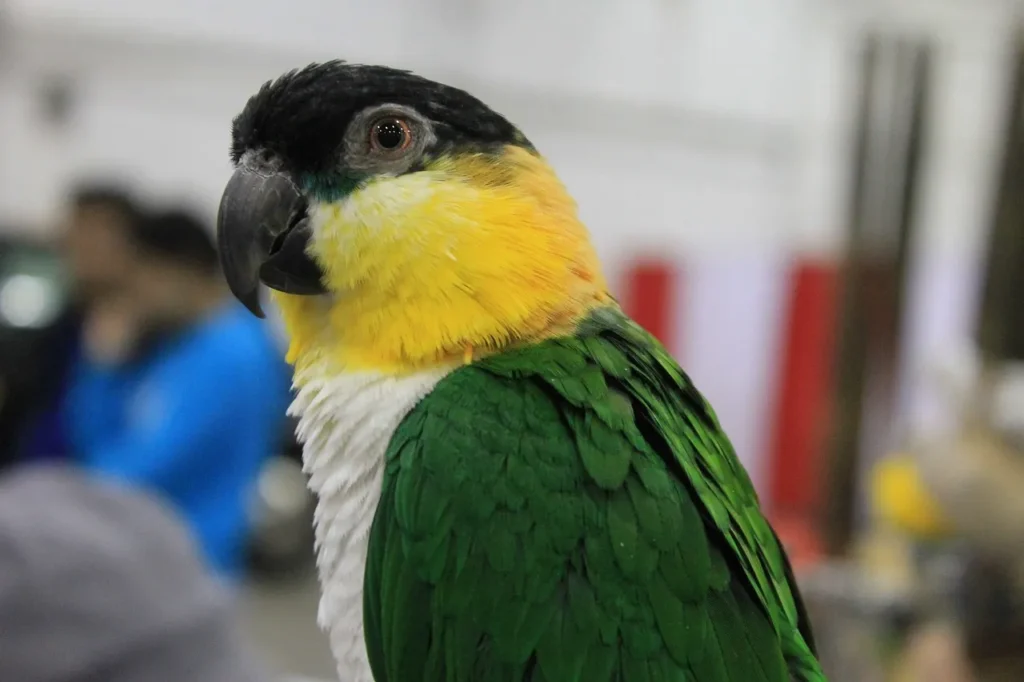
Similar to Lutino Macaws, Albino Macaws are not a separate species but a result of a genetic mutation that causes the absence of pigmentation in their feathers. These macaws have white plumage and distinctive pink eyes, giving them a unique and eye-catching appearance.
Albino Macaws are relatively rare, and their striking albino coloration makes them stand out among other macaw varieties. They are sought after by collectors and breeders for their rarity and beauty.
7. Albino Hyacinth Macaw

The Albino Hyacinth Macaw is a rare and visually stunning variation of the Hyacinth Macaw. Like other albino macaws, they have white plumage and pink eyes. These individuals are highly coveted by collectors and breeders due to their extreme rarity.
Breeding Albino Hyacinth Macaws is a challenging endeavor, as it requires specific genetic combinations. The presence of these albino variations underscores the complex genetics and diversity within the macaw family.
8. Indian Macaw

The term “Indian Macaw” is often used to describe macaws found in India. While India is not the native habitat of macaws, some species, particularly the Blue-and-Gold Macaw, are commonly seen in the country. These macaws are admired for their intelligence, vivid plumage, and ability to mimic sounds, making them popular as pets.
In India, as in other parts of the world, it’s crucial to ensure responsible pet ownership and support conservation efforts to protect macaws and their natural habitats.
9. Brazilian Macaw
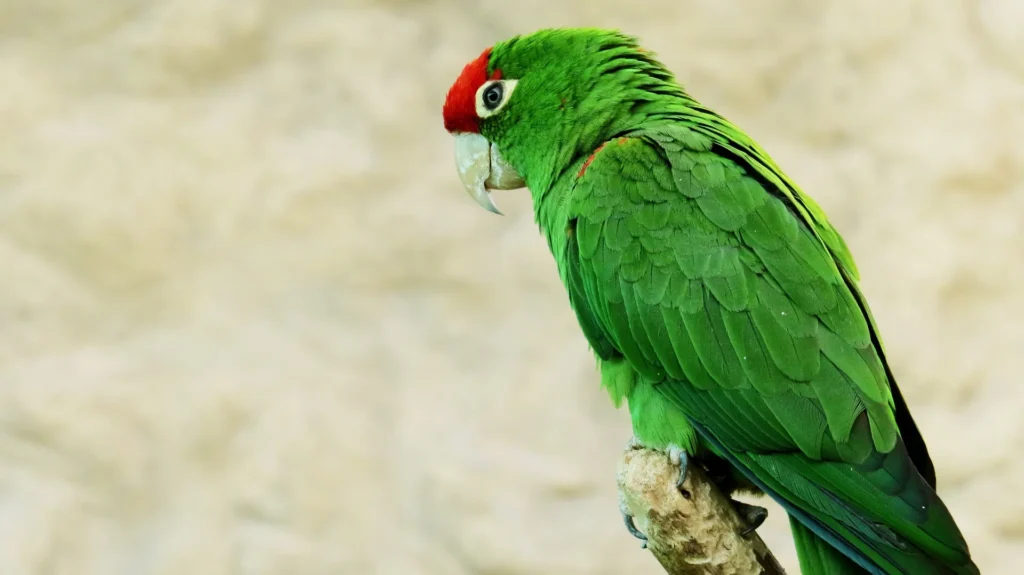
The Brazilian Macaw is a broad term used to describe macaw species found in Brazil, a country known for its rich biodiversity. Among the macaw species found in Brazil are the Hyacinth Macaw, Scarlet Macaw, and many others, each with its unique characteristics and habitats.
Brazil plays a vital role in macaw conservation, as it is home to several endangered macaw species. Conservation initiatives in Brazil aim to safeguard these majestic birds and their rainforest habitats.
10. Glaucous Macaw
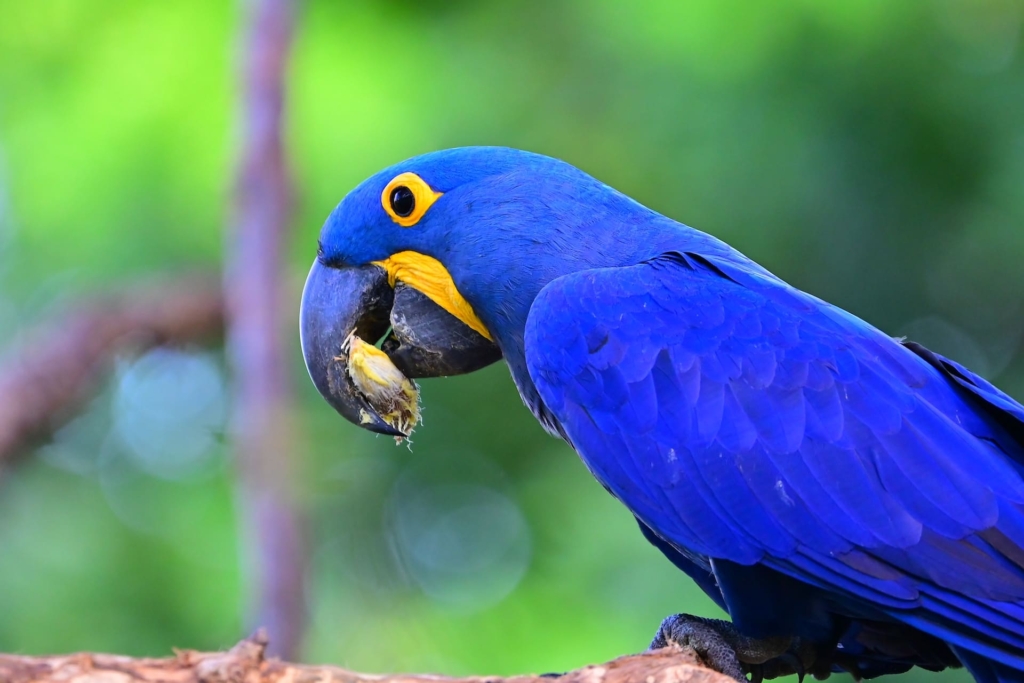
The Glaucous Macaw (Anodorhynchus glaucus) is a critically endangered macaw species native to South America. Its pale blue plumage sets it apart from other macaw species. Unfortunately, the Glaucous Macaw is on the brink of extinction, with only a few individuals remaining in captivity.
Conservation efforts are urgently needed to save this remarkable species from disappearing entirely. The Glaucous Macaw serves as a stark reminder of the threats facing many macaw species in the wild.
11. Military Macaw

The Military Macaw (Ara militaris) is so named for its green plumage, reminiscent of a military uniform. These macaws are native to Mexico and Central America and are known for their strong beaks, which allow them to crack open tough nuts and seeds.
In the wild, Military Macaws can often be seen in large flocks. They are social birds that form close bonds with their mates and can live for several decades. Habitat loss and the pet trade are the primary threats to their populations, emphasizing the importance of conservation efforts.
12. Catalina Macaw

Catalina Macaws are hybrid macaws resulting from the crossbreeding of a Blue-and-Gold Macaw and a Scarlet Macaw. These striking birds inherit the vibrant colors of their parent species, with a combination of blue, yellow, and red feathers. They are known for their captivating appearance and are often kept as pets due to their friendly and sociable nature.
Catalina Macaws are an excellent example of the variety that can be achieved through macaw hybridization, with each individual displaying a unique blend of colors.
13. Hahns Macaw

Hahns Macaws, scientifically known as Diopsittaca nobilis nobilis, are small and colorful parrots native to South America. They are often referred to as “mini macaws” due to their compact size compared to larger macaw species. Hahns Macaws are characterized by their vibrant green plumage and striking red markings on their face.
These birds are known for their playful and affectionate nature, making them popular choices as pets among those who may not have the space for larger macaw species. Their intelligence and ability to mimic sounds add to their appeal as companions.
14. Lear’s Macaw

Lear’s Macaw (Anodorhynchus leari) is a rare and critically endangered macaw species native to Brazil. It is primarily known for its stunning royal-blue plumage and unique habitat requirements. This macaw is specially adapted to life in the arid and rocky landscapes of the Brazilian caatinga.
Habitat loss and illegal trapping have pushed Lear’s Macaw to the brink of extinction. Conservation efforts, including the protection of their nesting sites and habitat restoration, are essential to prevent the loss of this beautiful species.
15. Sever Macaw

Sever Macaws, also known as Chestnut-Fronted Macaws (Ara severus), are medium-sized macaws found in South America. They are recognized by their colorful green plumage with a distinctive chestnut patch on their forehead.
These social birds often form close-knit family groups in the wild. Sever Macaws are known for their playful behavior and their ability to mimic sounds. While they are not as commonly kept as pets as some other macaw species, they are admired for their striking appearance.
16. Illiger Macaw
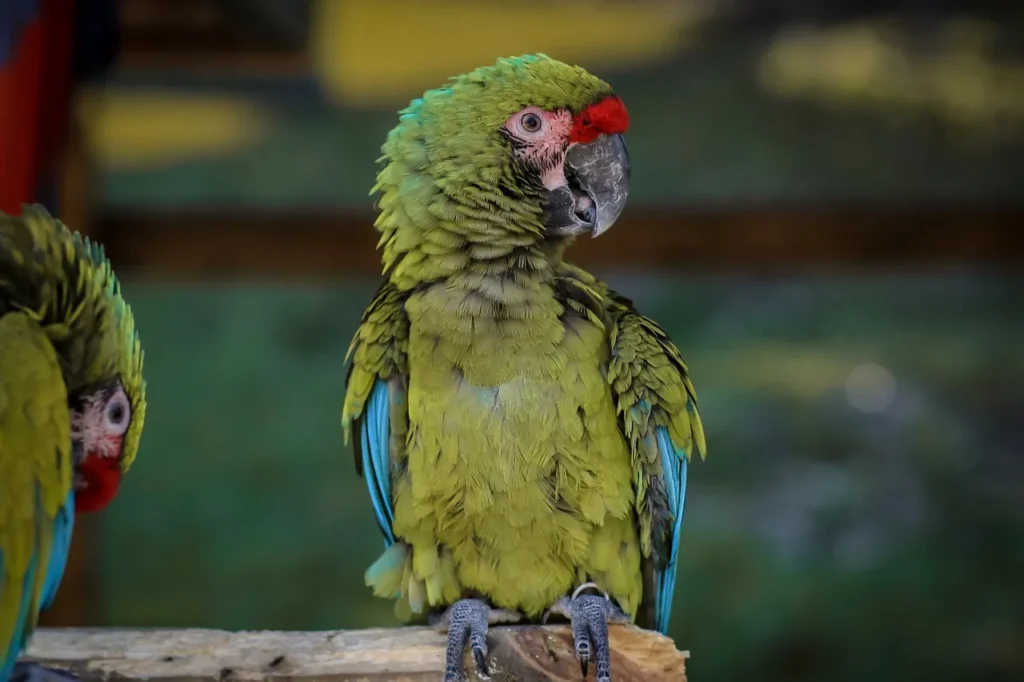
The Illiger Macaw, or Blue-Winged Macaw (Ara maracana), is a medium-sized macaw native to South America. They are known for their vibrant green feathers with blue wingtips, making them easily distinguishable from other macaw species.
Illiger Macaws are social birds that thrive on interaction with their owners. Their striking appearance and charming personalities make them appealing choices for those considering macaws as pets.
17. Camelot Macaw

Camelot Macaws are hybrid macaws resulting from the crossbreeding of a Scarlet Macaw and a Catalina Macaw. These macaws display a blend of vibrant red, blue, yellow, and green plumage, showcasing a captivating mix of their parent species’ colors.
Camelot Macaws are known for their friendly and outgoing personalities. They often form strong bonds with their owners and thrive on social interaction.
18. Hybrid Macaw

Hybrid Macaws are the result of crossbreeding different macaw species. These hybrids exhibit a wide range of color variations, combining the traits of their parent species. While they are not found in the wild, they are bred in captivity and can make charming and colorful pets.
The variety within the hybrid macaw category is vast, with each individual having a unique combination of colors and patterns. Breeders carefully select parent species to create these visually striking birds.
19. Shamrock Macaw

Shamrock Macaws are hybrid macaws bred from the cross between a Scarlet Macaw and a Military Macaw. They exhibit a striking combination of red, green, and blue plumage, reminiscent of the colors of a shamrock, hence their name.
These hybrid macaws are known for their vibrant appearance and friendly personalities. They make engaging and colorful additions to the homes of those who appreciate their beauty and social nature.
20. Chestnut Fronted Macaw

The Chestnut-Fronted Macaw (Ara severa) is a small macaw species found in Central and South America. They are characterized by their colorful green plumage and distinctive chestnut patch on their foreheads.
Chestnut-Fronted Macaws are social birds that often form flocks in the wild. Their small size and charming personalities make them appealing choices as pets among macaw enthusiasts.
21. Harlequin Macaw
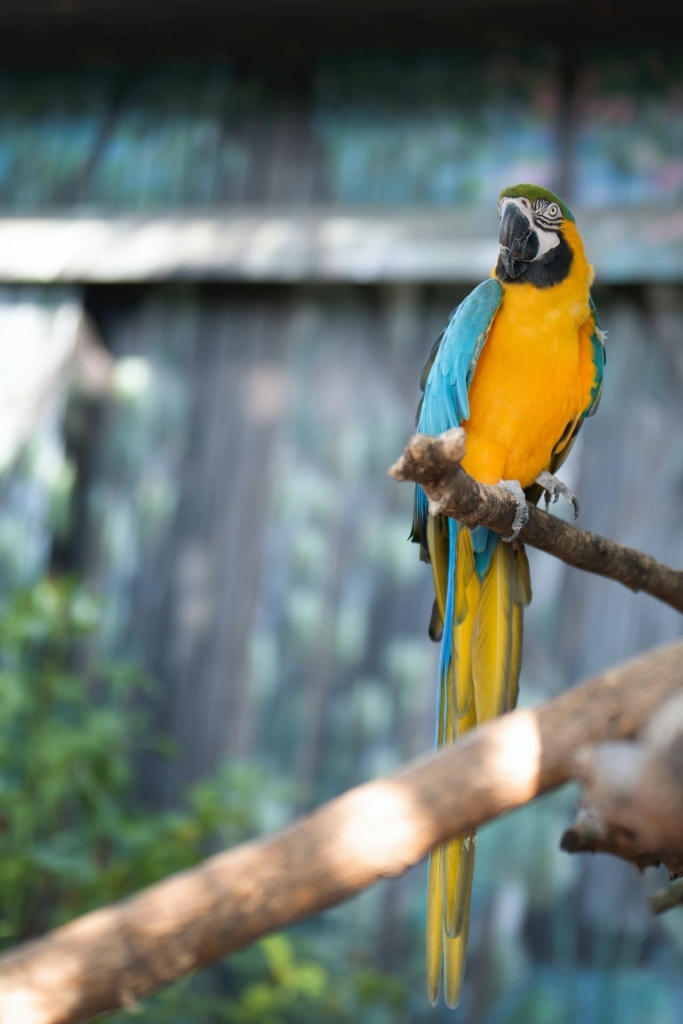
Harlequin Macaws are hybrid macaws resulting from the crossbreeding of a Blue-and-Gold Macaw and a Green-Winged Macaw. These striking birds display a mix of blue, gold, green, and red feathers, creating a visually captivating appearance.
Harlequin Macaws are known for their playful and friendly nature, making them popular choices among macaw enthusiasts. Their colorful plumage and engaging personalities make them stand out in the world of macaws.
22. Amazon Rainforest Scarlet Macaw
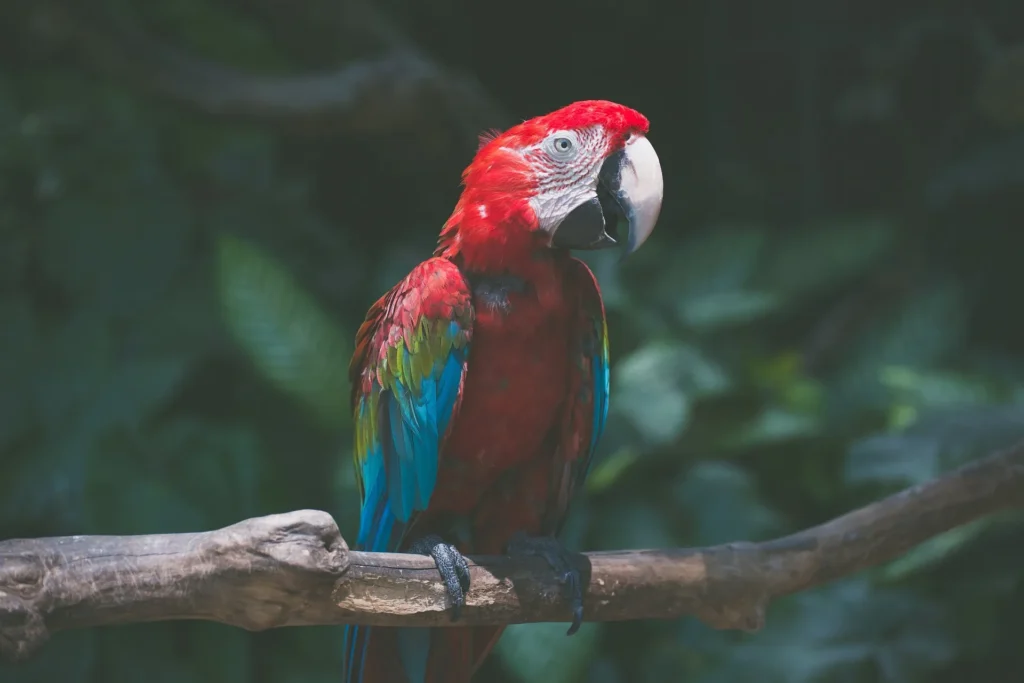
The Scarlet Macaw is often associated with the Amazon rainforest due to its vibrant presence in the region. These macaws play a vital role in the ecosystem by dispersing seeds through their diet and flight patterns. Their loud calls are a characteristic sound of the lush rainforest.
Scarlet Macaws are not only essential to the ecology of the Amazon but also serve as iconic symbols of the vibrant and biodiverse rainforest ecosystem.
23. Miligold Macaw

Miligold Macaws are hybrid macaws resulting from the crossbreeding of a Military Macaw and a Blue-and-Gold Macaw. They showcase a blend of vibrant colors from both parent species, creating a visually stunning appearance.
These hybrid macaws inherit the intelligence and social nature of their parent species, making them engaging and interactive pets for those who appreciate their striking plumage.
24. Buffon Macaw

The Buffon’s Macaw (Ara ambiguus) is a large macaw species found in Central and South America. They are known for their colorful green plumage with touches of blue and red, giving them a vibrant appearance.
Buffon Macaws are social birds that often form flocks in their natural habitat. Their striking plumage and charming personalities make them a favorite among macaw enthusiasts.
25. Martinique Macaw
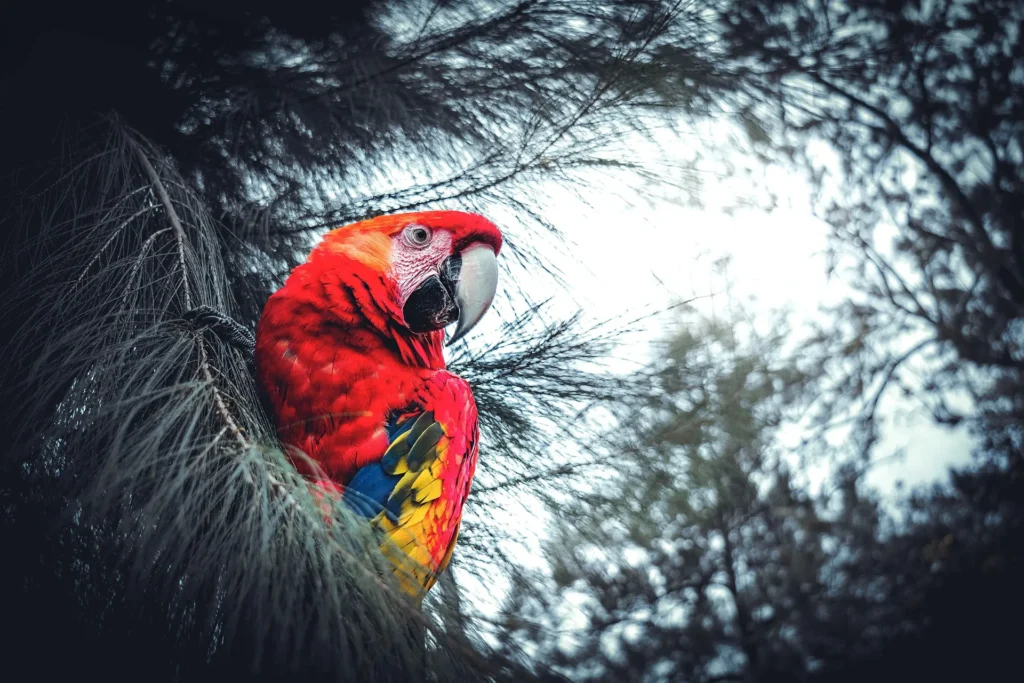
The Martinique Macaw is a hybrid macaw resulting from the crossbreeding of a Blue-and-Gold Macaw and a Scarlet Macaw. These captivating birds display a striking combination of blue, gold, and red feathers.
Like other hybrid macaws, Martinique Macaws have unique variations in their coloration, making each individual visually distinct. Their engaging personalities and vivid plumage make them popular among those who admire macaws.
26. Rio Macaw

The term “Rio Macaw” is often informally used to describe macaws found in the vicinity of the Rio de Janeiro region in Brazil. These macaws may include the Scarlet Macaw and other species commonly found in the area. The lush and diverse habitats near the Rio de Janeiro region provide a suitable environment for various macaw species.
27. Pet Macaw

Many macaw species, despite their wild origins, are kept as pets due to their intelligence, ability to mimic sounds, and striking appearance. However, keeping macaws as pets requires extensive knowledge and commitment to their care, as they are highly social and long-lived birds.
Pet Macaws thrive on interaction with their human companions and require ample space and mental stimulation. Responsible pet ownership is essential to ensure the well-being of these magnificent birds.
Macaw Colour Variations
Macaws are known for their stunning and vibrant plumage, which comes in a wide array of color variations. These variations not only make each species unique but also add to the allure of these magnificent birds. Let’s explore some of the most notable macaw color variations:
Purple Macaw
The Purple Macaw is a captivating macaw species known for its rich, deep purple plumage. It is a rare coloration within the macaw family and is often associated with the Hyacinth Macaw. The striking purple feathers make these birds stand out, and they are highly sought after by bird enthusiasts for their unique and regal appearance.
Purple Hyacinth Macaw
The Purple Hyacinth Macaw is a variation of the Hyacinth Macaw with predominantly purple plumage. These macaws are exceptionally rare and prized for their stunning coloration. The deep purple feathers create a mesmerizing contrast with their bright yellow eye rings and facial patches.

Blue Macaw
Blue Macaws are a broad category of macaw species known for their predominantly blue plumage. This includes several species such as the Hyacinth Macaw and the Blue-and-Gold Macaw, each with its unique shade of blue. Blue Macaws are celebrated for their vibrant and eye-catching colors.
Blue Macaw Rio
The term “Blue Macaw Rio” is often used informally to refer to blue macaws found in the vicinity of Rio de Janeiro, Brazil. These birds may include the Hyacinth Macaw and the Blue-and-Gold Macaw, which are commonly seen in the region’s lush rainforests.
Blue Spix Macaw
The Blue Spix’s Macaw, also known as the Little Blue Macaw, is a critically endangered macaw species native to Brazil. It is celebrated for its bright blue plumage, which distinguishes it from other macaw species. Conservation efforts are underway to save this rare bird from extinction.
Great Green Macaw
The Great Green Macaw, also known as Buffon’s Macaw (Ara ambiguus), is a large macaw species found in Central and South America. While primarily green, they have colorful accents, such as blue and red feathers on their wings. These striking macaws are known for their majestic appearance and social nature.
White Macaw
White Macaws are not a distinct species but a color variation within the macaw family. These macaws have predominantly white plumage, often with touches of color on their wings or faces. The Albino Hyacinth Macaw mentioned earlier can also be considered a white macaw due to its lack of pigmentation.
Black Macaw
The Black Macaw, scientifically known as the Lear’s Macaw (Anodorhynchus leari), is a rare macaw species native to Brazil. Despite its name, it is primarily known for its striking royal-blue plumage, not black. The name “black” is derived from its dark facial skin, which contrasts with its blue feathers.
Red Macaws
Red Macaws, such as the Scarlet Macaw and the Red-and-Green Macaw, are known for their vibrant red plumage. These macaws often have blue and yellow accents on their wings and tails, creating a stunning and colorful display.
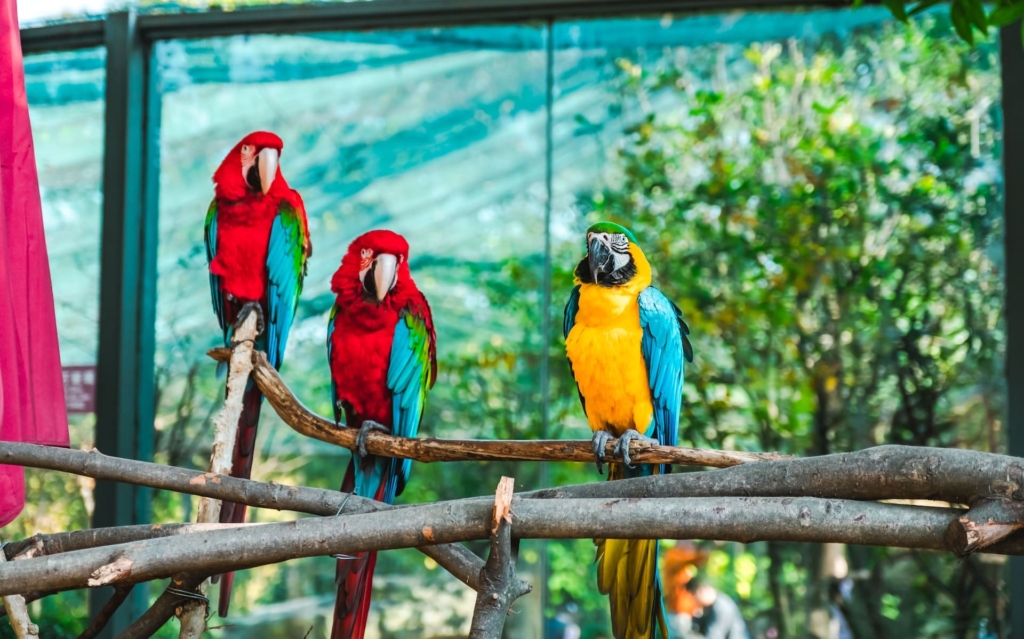
Macaw Yellow
Yellow is a prominent color in many macaw species, particularly the Blue-and-Gold Macaw and the Yellow-Collared Macaw. These macaws are recognized for their vibrant yellow plumage, which ranges from deep golden hues to bright lemon-yellow shades.
Golden Macaw
The Golden Macaw, often referred to as the Golden Conure or Queen of Bavaria Conure (Guaruba guarouba), is a small parrot species with predominantly golden-yellow plumage. These birds are native to northern Brazil and are known for their striking coloration and lively personalities.
Grey Macaw
Grey Macaws, such as the Grey Parrot (Psittacus erithacus), belong to a different parrot family than macaws. However, the term “Grey Macaw” is sometimes used informally to describe macaw species with grey plumage, such as the Grey-Cheeked Parakeet (Brotogeris pyrrhoptera), which has greyish-green feathers.
Pink Macaw
Pink Macaws, such as the Rose-Faced Parrot (Pyrrhura roseifrons), are often small to medium-sized parrot species with pink plumage on their faces or bodies. While they may not be macaws, their unique coloration and charming personalities make them appealing to bird enthusiasts.
Blue And Gold Macaw
The Blue-and-Gold Macaw (Ara ararauna) is one of the most iconic macaw species, known for its vibrant blue and yellow plumage. These macaws are highly social, intelligent, and are often kept as pets due to their engaging personalities.
Blue And Yellow Macaw
The Blue-and-Yellow Macaw, also known as the Blue-and-Gold Macaw, is recognized for its dazzling blue and yellow feathers. These macaws are native to Central and South America and are celebrated for their beauty and ability to mimic sounds.
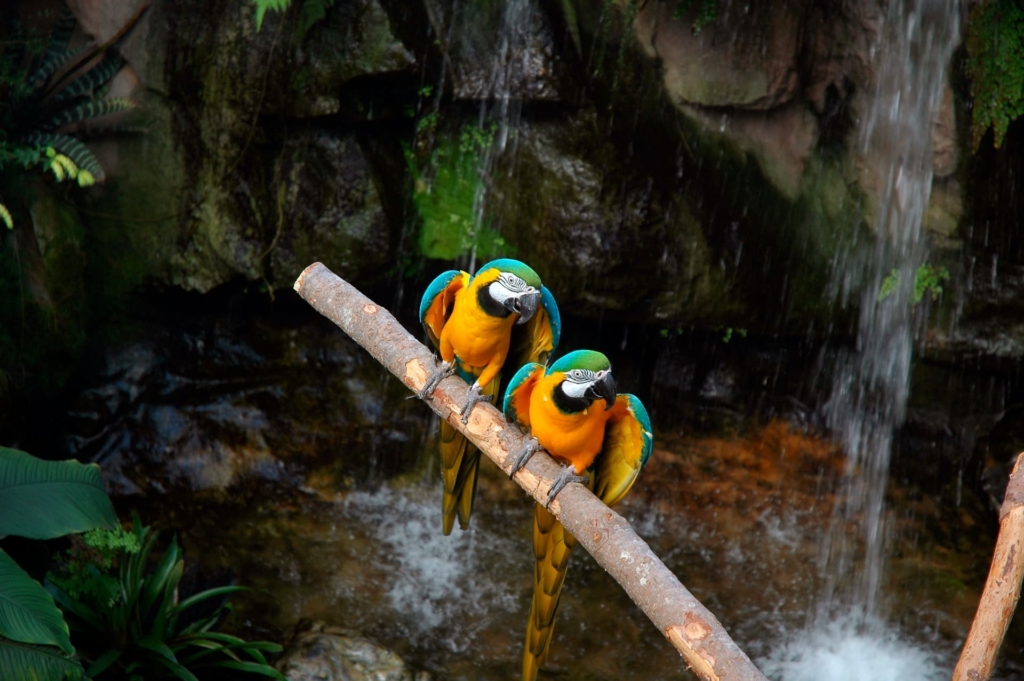
Red And Green Macaw
The Red-and-Green Macaw (Ara chloropterus) is a large macaw species with predominantly red plumage and green accents on its wings and back. These macaws are known for their loud calls and are often seen in pairs or small groups in their natural habitat.
Green Wing Macaw
The Green-Winged Macaw (Ara chloropterus) is another macaw species with green plumage, distinguished by its red underwing feathers. These macaws are beloved for their striking appearance and playful behavior.
Rainbow Macaw
The term “Rainbow Macaw” is often used informally to describe macaw species with a wide range of colorful plumage, such as the Scarlet Macaw, which combines red, blue, and yellow feathers, creating a rainbow-like effect.
Yellow Collared Macaw
The Yellow-Collared Macaw (Primolius auricollis) is a small macaw species known for its vibrant yellow collar or neck ring. They have green plumage on their bodies and wings, making them visually distinct and appealing to bird enthusiasts.
Blue Winged Macaw
Blue-Winged Macaws, like the Blue-Winged Macaw (Primolius maracana), are characterized by their bright blue wings and green bodies. These smaller macaws are native to South America and are admired for their colorful appearance.
Blue Headed Macaw
The Blue-Headed Macaw (Primolius couloni) is a small macaw species with a predominantly green body and a striking blue head. Their charming personalities and colorful plumage make them attractive choices for those considering macaws as pets.
Fronted Macaw
Fronted Macaws, including the Severe Macaw (Ara severa) and the Chestnut-Fronted Macaw (Ara severus), are medium-sized macaws known for their distinctive chestnut-colored patches on their foreheads. These colorful accents add to their charm and visual appeal.
Red Bellied Macaw
The Red-Bellied Macaw (Orthopsittaca manilata) is a small macaw species native to South America. They are known for their vibrant red bellies and green plumage on the rest of their bodies. Their colorful appearance and friendly disposition make them popular among bird enthusiasts.

Red Shouldered Macaw
Red-Shouldered Macaws, scientifically known as Diopsittaca nobilis cumanensis, are small macaws with predominantly green plumage and striking red markings on their shoulders. These charming birds are known for their playful behavior and are often kept as pets.
Blue Throat Macaw
The Blue-Throat Macaw (Ara glaucogularis) is a critically endangered macaw species native to Bolivia. They are named for the distinctive blue patch on their throats, which contrasts with their green plumage. Conservation efforts are underway to protect these rare and beautiful birds.
Macaw Parrot Price
The price of Macaw parrots in the USA typically ranges from $1,000 to $10,000 or more, depending on the species and factors like age and training. In India, Macaw parrot prices generally start from INR 50,000 and can go up to INR 1,00,000 or higher, depending on various factors, including the bird’s species and age.
Macaw Price in United States:
In the United States, the price of Macaws can range widely. Smaller and more common species like the Blue-and-Gold Macaw may start at around $1,000 to $2,000. Rare and larger species like the Hyacinth Macaw can cost $10,000 or more. The price can increase for hand-raised and trained Macaws.
Macaw Price in United Kingdom:
In the United Kingdom, Macaws are generally more expensive due to importation and care costs. Prices for Blue-and-Gold Macaws may start at £1,500 to £2,500 or higher. Rare species like the Hyacinth Macaw can cost £10,000 or more.
Macaw Price in Australia:
In Australia, the price of Macaws can also vary. Blue-and-Gold Macaws may start at around AUD 2,000 to AUD 4,000, while more rare species like the Hyacinth Macaw can cost AUD 15,000 or more. Prices can fluctuate due to demand and availability.
Macaw Price in Canada:
In Canada, Macaw prices are similar to those in the United States. Blue-and-Gold Macaws may start at around CAD 1,500 to CAD 3,000, with larger and rarer species like the Hyacinth Macaw costing CAD 10,000 or more.
Macaw Price in India:
In India, Macaw prices can be lower compared to Western countries. Blue-and-Gold Macaws may start at around INR 50,000 to INR 1,00,000 or more. Prices may vary depending on the city and availability.
Macaw Bird Price
The price of Macaw birds can vary depending on the species, age, and location. In the USA, Macaw bird prices range from $1,000 to $10,000 or more. In India, Macaw bird prices start from INR 50,000 and can go up to INR 1,00,000 or higher.
Spix Macaw Price
The price of a Spix Macaw can range from $40,000 to $90,000 or even higher, depending on factors such as its age, health, and the specific circumstances of the sale.
Hyacinth Macaw Price
Hyacinth Macaws, the largest of all Macaw species, come with a substantial price tag. In the United States, they often exceed $10,000 due to their size and captivating appearance. In India, where they are rarer and subject to import regulations, prices can start from INR 10,00,000 and go higher.
Hahns Macaw Price
Hahns Macaws, smaller and more affordable than their larger cousins, are relatively budget-friendly. In the USA, prices typically range from $600 to $2,000, making them a popular choice among Macaw enthusiasts. In India, they are available starting at around INR 50,000.
Military Macaw Price
Military Macaws, with their striking appearance, fall within a mid-range price bracket. In the USA, prices can range from $800 to $2,500. In India, where they are less common, they may start from INR 60,000.
Scarlet Macaw Price
Scarlet Macaws, renowned for their vibrant red plumage, are moderately priced within the Macaw market. In the USA, prices generally range from $1,500 to $2,500. In India, they can begin at around INR 70,000, making them a desirable choice for enthusiasts.
Hahns Macaw Price In India
Hahns Macaw prices in India, while still dependent on factors such as age and coloration, typically commence at INR 50,000 to INR 80,000, providing a more affordable option for those interested in Macaw ownership.
Blue Macaw Price In India
The category of Blue Macaws in India encompasses various species, with Blue-and-Gold Macaws, for instance, often starting from INR 1,00,000 and goes upto INR 1,40,000. Prices can vary depending on the specific species and their availability in the market.
Red Macaw Price In India
Prices for Red Macaws in India typically initiate at INR 70,000 to INR 90,000, influenced by factors such as the species and the bird’s age, offering a colorful addition to Macaw collections. These Prices may vary based on several factors such as Breeders, Location and Availability.
White Macaw Parrot Price In India
White Macaw parrots, known for their elegance, are priced between INR 80,000 and INR 1,50,000 or more in India, reflecting their unique beauty and charm. These Prices may vary based on several factors such as Breeders, Location and Availability.
Blue Macaw Parrot Price In India
In India, Blue Macaw parrot prices can vary significantly depending on the species. Blue-and-Gold Macaw prices often start from INR 1,00,000 and goes upto INR 1,60,000, presenting an opportunity to own a stunning and intelligent bird.
Blue And Gold Macaw Price In India
Blue and Gold Macaws, with their vibrant blue and yellow plumage, are prized among Macaw enthusiasts. In India, these majestic birds typically range in price from ₹1,00,000 to ₹2,50,000 or more, depending on factors such as age, training, and lineage.
Blue And Yellow Macaw Price In India
: Blue and Yellow Macaws, known for their beautiful blue and yellow feathers, are another sought-after Macaw species in India. Prices for these vibrant birds can start from ₹1,00,000 and go up to ₹2,50,000 or higher, depending on factors such as age and lineage.
Macaw Bird Price In Kolkata
Macaw bird prices in Kolkata, India, are influenced by local market dynamics and availability. Prices in Kolkata may align with or slightly differ from those in other major Indian cities. Typically, prices for Macaw birds in Kolkata, as in other cities, start at ₹50,000 and can go up to ₹1,30,000.
Macaw Parrot Price In Pakistan
The prices of Macaw parrots in Pakistan may differ from those in India due to factors like import regulations, local demand, and availability. Generally, Macaw parrot prices in Pakistan can range from ₹50,000 to ₹10,00,000+ for rarer species.
Baby Macaw Parrot Price In India
Baby Macaw parrots are often more affordable than their adult counterparts, making them an attractive option for those looking to raise and train their birds. Prices for baby Macaw parrots in India can vary based on the species and age, typically starting at ₹40,000 and going up to ₹2,00,000 or more.
Macaw Parrot Price In Delhi
Macaw parrot prices in Delhi, the capital city of India, are influenced by local market conditions and demand. Prices in Delhi may be similar to or slightly differ from those in other major Indian cities. Typically, prices range from ₹50,000 to well over ₹10,00,000 for rarer Macaw species.
Macaw Parrot Baby Price In Delhi
The price for baby Macaw parrots in Delhi can start at around ₹40,000 and goes upto ₹80,000, depending on factors such as the specific species and the bird’s age. Baby Macaw parrots offer a unique opportunity for owners to bond with and train their avian companions from an early age.
Macaw Parrot Price In Bangalore
Macaw parrot prices in Bangalore, India, can vary based on local market dynamics and demand. Prices in Bangalore typically align with those in other major Indian cities, ranging from ₹60,000 to ₹10,00,000+ for rarer Macaw species.
Macaw Parrot Price In Kerala
In Kerala, India, Macaw parrot prices are influenced by local market conditions and supply. Typically ranging from ₹59,000 to ₹10,00,000+ for rarer species, prices may fluctuate based on regional demand and availability.
Macaw Parrot Price In Chennai
Prices for Macaw parrots in Chennai, India, may be influenced by local demand and availability. Generally, they align with those in other major Indian cities, starting at ₹50,000 and exceeding ₹10,00,000+ for rarer Macaw species.
Macaw Parrot Price In Hyderabad
Macaw parrot prices in Hyderabad, India, can vary depending on local market dynamics and demand. Typically, they align with prices in other major Indian cities, ranging from ₹58,000 to ₹10,00,000+ for rarer Macaw species.
Macaw Parrot Price In Lucknow
In Lucknow, India, Macaw parrot prices may be influenced by local market conditions and the availability of these birds. Prices generally range from ₹65,000 to well over ₹10,00,000 for rarer Macaw species. Those considering Macaw ownership in Lucknow should research the needs of these magnificent birds and ensure they can meet them responsibly.
Macaw Parrot Price In Mumbai
Macaw parrot prices in Mumbai, India, typically range from ₹60,000 to well over ₹10,00,000+ for rarer species. Prices are influenced by local demand and availability. Prospective owners in Mumbai should prioritize ethical sourcing and provide the necessary care and attention to these vibrant and intelligent birds.
Macaw Parrot Price In Pune
Prices for Macaw parrots in Pune, India, often align with those in other major Indian cities, ranging from ₹55,000 to well over ₹10,00,000+ for rarer Macaw species. It’s essential for prospective owners in Pune to engage with reputable breeders and provide proper care for these engaging and long-lived companions.
Macaw Parrot Price In Jaipur
Macaw parrot prices in Jaipur, India, may vary but often range from ₹40,000 to well over ₹10,00,000+ for rarer species. Responsible sourcing and ethical ownership are vital considerations for those contemplating Macaw ownership in Jaipur. Proper care and commitment are necessary to ensure the well-being of these captivating birds.
Macaw Prices In Major Indian Cities
Here are prices for various types of Macaws in major Indian cities:
| City | Blue & Gold Macaw (₹) | Scarlet Macaw (₹) | Hyacinth Macaw (₹) | Hahns Macaw (₹) | Military Macaw (₹) | Baby Macaw (Start) (₹) | Baby Macaw (End) (₹) | Macaw Bird (Start) (₹) | Macaw Bird (End) (₹) |
|---|---|---|---|---|---|---|---|---|---|
| Mumbai | ₹1,00,000 – ₹2,50,000 | ₹70,000 – ₹1,50,000 | ₹15,00,000 – ₹20,00,000 | ₹60,000 – ₹2,50,000 | ₹70,000 – ₹3,00,000 | ₹50,000 – ₹2,50,000 | ₹60,000 – ₹2,50,000 | ₹70,000 – ₹15,00,000+ | ₹70,000 – ₹15,00,000+ |
| Delhi | ₹1,10,000 – ₹2,60,000 | ₹75,000 – ₹1,60,000 | ₹16,00,000 – ₹22,00,000 | ₹65,000 – ₹2,60,000 | ₹75,000 – ₹3,20,000 | ₹55,000 – ₹2,60,000 | ₹65,000 – ₹2,60,000 | ₹75,000 – ₹16,00,000+ | ₹75,000 – ₹16,00,000+ |
| Bangalore | ₹1,05,000 – ₹2,55,000 | ₹72,000 – ₹1,55,000 | ₹14,50,000 – ₹21,00,000 | ₹62,000 – ₹2,55,000 | ₹72,000 – ₹3,10,000 | ₹52,000 – ₹2,55,000 | ₹62,000 – ₹2,55,000 | ₹72,000 – ₹14,50,000+ | ₹72,000 – ₹14,50,000+ |
| Chennai | ₹1,05,000 – ₹2,55,000 | ₹72,000 – ₹1,55,000 | ₹14,50,000 – ₹21,00,000 | ₹62,000 – ₹2,55,000 | ₹72,000 – ₹3,10,000 | ₹52,000 – ₹2,55,000 | ₹62,000 – ₹2,55,000 | ₹72,000 – ₹14,50,000+ | ₹72,000 – ₹14,50,000+ |
| Hyderabad | ₹1,10,000 – ₹2,60,000 | ₹75,000 – ₹1,60,000 | ₹16,00,000 – ₹22,00,000 | ₹65,000 – ₹2,60,000 | ₹75,000 – ₹3,20,000 | ₹55,000 – ₹2,60,000 | ₹65,000 – ₹2,60,000 | ₹75,000 – ₹16,00,000+ | ₹75,000 – ₹16,00,000+ |
| Kolkata | ₹1,00,000 – ₹2,50,000 | ₹70,000 – ₹1,50,000 | ₹14,00,000 – ₹20,00,000 | ₹60,000 – ₹2,40,000 | ₹70,000 – ₹3,00,000 | ₹50,000 – ₹2,40,000 | ₹60,000 – ₹2,40,000 | ₹70,000 – ₹14,00,000+ | ₹70,000 – ₹14,00,000+ |
| Pune | ₹1,05,000 – ₹2,55,000 | ₹72,000 – ₹1,55,000 | ₹14,50,000 – ₹21,00,000 | ₹62,000 – ₹2,55,000 | ₹72,000 – ₹3,10,000 | ₹52,000 – ₹2,55,000 | ₹62,000 – ₹2,55,000 | ₹72,000 – ₹14,50,000+ | ₹72,000 – ₹14,50,000+ |
| Jaipur | ₹1,00,000 – ₹2,45,000 | ₹70,000 – ₹1,50,000 | ₹14,00,000 – ₹20,00,000 | ₹60,000 – ₹2,40,000 | ₹70,000 – ₹3,00,000 | ₹50,000 – ₹2,40,000 | ₹60,000 – ₹2,40,000 | ₹70,000 – ₹14,00,000+ | ₹70,000 – ₹14,00,000+ |
| Lucknow | ₹1,00,000 – ₹2,50,000 | ₹70,000 – ₹1,50,000 | ₹14,00,000 – ₹20,00,000 | ₹60,000 – ₹2,40,000 | ₹70,000 – ₹3,00,000 | ₹50,000 – ₹2,40,000 | ₹60,000 – ₹2,40,000 | ₹70,000 – ₹14,00,000+ | ₹70,000 – ₹14,00,000+ |
Factors that Affect the Price of Macaw
Factors That Affect the Price of Macaw:
- Species and Rarity: The type of Macaw species significantly influences the price. Hyacinth Macaws, for example, are among the most expensive due to their rarity. Common species like Blue and Gold Macaw are comparatively more affordable.
- Age: The age of the Macaw can impact its price. Baby Macaw are usually more expensive than adults because they require specialized care during their early development.
- Training and Behavior: Macaws that are well-trained and have a friendly temperament may be priced higher. Behavioral issues or aggressiveness can lower the price.
- Color Variations: Some Macaw have unique color mutations, which can make them more valuable in the market. For instance, Albino Macawsor rare color variations can command higher prices.
- Health and Medical History: A Macaw’s health status and medical history are critical. A bird with a clean bill of health and up-to-date vaccinations may be priced higher than one with health issues.
Monthly Maintenance Cost of Macaw:
Potential owners should consider the ongoing monthly maintenance cost of a Macaw. This includes expenses for high-quality bird food, cage maintenance, toys, and regular veterinary check-ups. Proper care and a suitable environment are essential for a Macaw’s well-being and can contribute to its overall cost of ownership.
Macaw Facts
Here are some interesting facts about Macaws:
- Diverse Species: Macaws are a group of colorful parrots known for their striking plumage. There are over 370 different species of parrots, and Macaws are some of the largest and most recognizable among them.
- Vibrant Colors: One of the most distinctive features of Macaws is their vibrant and varied coloration. They come in a wide range of colors, including red, blue, green, yellow, and combinations of these hues.
- Long Lifespan: Macaws are known for their impressive longevity. In captivity, they can live for several decades, with some reaching up to 80 years of age. This makes them long-term companions for those who choose to care for them.
- Social Creatures: Macaws are highly social birds and thrive on interaction and companionship. They form strong bonds with their human owners and can be quite affectionate.
- Excellent Mimics: Macaws are renowned for their ability to mimic sounds and human speech. They are among the best talkers in the parrot world and can learn a wide vocabulary.
- Impressive Size: Some Macaw species, such as the Hyacinth Macaw, are among the largest parrots in the world. They can have wingspans of up to 4 feet (1.2 meters) and weigh over 3 pounds (1.4 kilograms).
- Rainforest Dwellers: Many Macaw species are native to the rainforests of Central and South America. They inhabit dense forests and rely on these habitats for their food sources.
- Dietary Habits: Macaws have strong, hooked beaks designed for cracking open nuts and seeds. They are also known to eat fruits, flowers, and even clay from riverbanks, which helps neutralize toxins in their diet.
- Conservation Concerns: Some Macaw species, such as the Spix’s Macaw, have faced severe threats due to habitat loss and illegal wildlife trade. Conservation efforts are in place to protect and reintroduce these endangered species.
- Distinctive Noises: Macaws are not known for being quiet birds. They can produce loud screeches, squawks, and calls, which serve various purposes, including communication, bonding, and marking territory.
Pros and Cons of Macaw Birds
Here are some common pros and cons of owning a Macaw as a pet:
| Pros of Macaw Ownership | Cons of Macaw Ownership |
|---|---|
| Beautiful and Colorful Plumage | High Initial Purchase Cost |
| Long Lifespan | Loud Vocalizations |
| Intelligent and Social | Extensive Space Requirements |
| Strong Bonding with Owners | Destructive Chewing Habits |
| Excellent Talking Abilities | Requires Social Interaction |
| Playful and Affectionate | Demands Attention and Time |
| Impressive Mimicry Skills | Messy Eaters and Droppings |
| Unique Personality | Potential Health Issues |
| Potential Lifelong Companion | Legal Regulations and Permits |
| Captivating and Unique Pet | Allergies and Asthma Triggers |
Care Tips for Macaw
Here are some essential care tips for Macaws to ensure they live healthy, happy lives as pets:
- Proper Diet: Provide a balanced diet rich in fruits, vegetables, nuts, and high-quality pellets formulated for Macaws. Ensure fresh water is always available. Avoid feeding them foods that are toxic to birds, like chocolate and avocados.
- Spacious Cage: Macaws need a large and sturdy cage to accommodate their size and active nature. The cage should be spacious enough for them to move around, stretch their wings, and play.
- Social Interaction: Macaws are highly social birds that thrive on interaction. Spend quality time with your Macaw daily, engaging in activities like talking, playing, and training.
- Training: Train your Macaw using positive reinforcement techniques. Teaching them tricks and commands not only provides mental stimulation but also strengthens your bond.
- Exercise: Allow your Macaw plenty of supervised out-of-cage time to exercise and stretch their wings. A safe, bird-proofed room or outdoor aviary is ideal.

Health Issues of Macaw
Macaws are generally hardy birds when kept in the right conditions and given proper care. However, like all pets, they can be prone to certain health issues. Here are some common health issues that Macaws may face:
- Respiratory Infections: Macaws can be susceptible to respiratory infections, especially if they are exposed to drafts or kept in damp or dirty environments. Symptoms may include sneezing, nasal discharge, coughing, and labored breathing.
- Feather Plucking: Behavioral issues or stress can lead to feather plucking in Macaws. This can result in bald patches and damage to their plumage. Identifying and addressing the underlying cause is essential.
- Psittacosis (Parrot Fever): This bacterial infection can affect Macaws and other parrots. Symptoms include lethargy, loss of appetite, nasal discharge, and diarrhea. It’s zoonotic, meaning it can be transmitted to humans, so immediate treatment is vital.
- Gastrointestinal Issues: Macaws are prone to digestive problems if they consume inappropriate foods or if their diet lacks fiber. Symptoms may include diarrhea, vomiting, and loss of appetite.
- Obesity: Overfeeding and lack of exercise can lead to obesity in Macaws. Obesity can cause a range of health problems, including heart disease and joint issues.
Macaw Size
Macaws vary in size depending on the species. They can range from about 20 inches (50 centimeters) for the smaller species like the Hahns Macaw to over 40 inches (100 centimeters) for larger species like the Hyacinth Macaw. These majestic birds are known for their impressive size and vibrant plumage.
Macaw Size And Weight
The size and weight of Macaws also vary by species. Smaller Macaws like the Hahns Macaw may weigh around 150 to 200 grams, while larger species like the Hyacinth Macaw can weigh up to 1.5 kilograms (3.3 pounds). Their size and weight contribute to their unique appearance and physical characteristics.
Hyacinth Macaw Size
The Hyacinth Macaw (Anodorhynchus hyacinthinus), known for its stunning deep-blue plumage, is the largest of all Macaw species. It can reach an impressive length of up to 40 inches (100 centimeters) from beak to tail and can weigh between 1.2 to 1.7 kilograms (2.6 to 3.7 pounds). Its size makes it one of the most iconic and remarkable parrots in the world.
Macaw Cichlid
The term “Macaw Cichlid” refers to a species of freshwater fish known for its vibrant colors and striking appearance. This fish is not related to Macaw parrots but is named for its colorful resemblance to these birds. Macaw Cichlids are popular in the aquarium trade for their lively colors.
Macaw Eggs
Macaw eggs are typically white and oval-shaped. The size of the eggs varies depending on the Macaw species. The incubation period for Macaw eggs varies but is generally around 24 to 28 days. Macaw parents take turns incubating the eggs and caring for the chicks after they hatch.
Macaw Flying
Macaws are known for their powerful and graceful flight. They have strong wing muscles that allow them to soar through the canopy of the rainforest with agility. Their ability to fly is crucial for foraging, escaping predators, and moving between different parts of their habitat.
Macaw Feathers
Macaws are renowned for their vibrant and colorful feathers. Their plumage can include shades of blue, red, green, yellow, and more. These feathers serve various functions, including insulation, attracting mates, and camouflage in their natural habitat. The striking colors also make them highly sought-after in the pet trade.

Macaw Talking
Macaws are among the most skilled talkers among parrot species. They have a remarkable ability to mimic human speech and sounds. While not all Macaws talk, many can learn a wide range of words and phrases with training and social interaction.
Macaw Toys
Providing toys is essential for the mental and physical well-being of pet Macaws. These intelligent birds need stimulation and enrichment to prevent boredom. Toys such as puzzle feeders, chewable items, and interactive playthings help keep Macaws engaged and entertained.
Macaw Cage
Macaws, whether kept as pets or in captivity for conservation purposes, require spacious and secure cages. Their large size necessitates roomy enclosures that allow for movement and exercise. Sturdy construction and non-toxic materials are essential for their safety.
Macaw Biting
Macaws can bite as a form of communication or defense. Understanding their body language and behavior is crucial for preventing bites. Proper training and socialization can help minimize biting behavior in pet Macaws.
Macaw Lifespan
The lifespan of Macaws can vary by species and care. In general, Macaws can live for several decades, with some reaching 60 to 80 years in captivity. Providing proper nutrition, veterinary care, and a stimulating environment contributes to their longevity.
Hyacinth Macaw Lifespan
The Hyacinth Macaw, being one of the largest Macaw species, can have a significant lifespan in captivity. With proper care, they can live for up to 50 to 60 years or more. Their long lifespan makes them a lifelong commitment for their owners.
Food for Macaw
Popular Food for Macaws:
| Food Type | Description |
|---|---|
| Fresh Fruits | Apples, bananas, grapes, oranges, and mangoes are nutritious and enjoyable for Macaws. Avoid feeding avocados, which are toxic. |
| Vegetables | Offer a variety of vegetables like carrots, broccoli, sweet potatoes, and leafy greens. |
| High-Quality Pellets | Commercial bird pellets formulated for Macaws provide essential nutrients. |
| Nuts | Macaws enjoy nuts like almonds, walnuts, and unsalted peanuts. Feed in moderation due to their high fat content. |
| Seeds | Limited quantities of seeds like sunflower and safflower seeds can be included but should not be the primary diet. |
| Legumes | Cooked legumes like lentils, chickpeas, and beans offer protein and fiber. Ensure they are well-cooked and unseasoned. |
| Grains | Cooked grains such as rice, quinoa, and whole wheat pasta can be part of their diet. |
| Calcium Sources | Provide cuttlebone, mineral blocks, or calcium supplements to support their bone health. |
| Fresh Water | Access to clean, fresh water is essential at all times for hydration. Change it daily. |
Names for Macaw
Recommended Names for Macaws:
| Name | Description |
|---|---|
| Rio | A vibrant and energetic name for a Macaw. |
| Jewel | Reflects their colorful and jewel-like plumage. |
| Charlie | A friendly and approachable name. |
| Luna | Suggests a connection to the moon and the night, which can be associated with their vocalizations. |
| Mango | A playful name inspired by their love for this fruit. |
| Zazu | A fun and whimsical name, reminiscent of a character from “The Lion King.” |
| Scarlet | Perfect for a Scarlet Macaw with bright red plumage. |
| Skye | Evokes images of the sky, where Macaws often fly. |
| Sunshine | Reflects their cheerful and sunny disposition. |
| Chico | A cute and endearing name for a small Macaw. |
| Sapphire | Ideal for a Blue and Gold Macaw with vibrant blue feathers. |
| Amigo | Meaning “friend” in Spanish, highlighting their sociable nature. |
| Tiki | A playful and tropical-sounding name. |
| Picasso | For a Macaw with unique and artistic markings. |
| Bella | A charming and timeless name. |
| Azul | Meaning “blue” in Spanish, suitable for blue-colored Macaws. |
| Sparky | Captures their lively and energetic personality. |
| Rainbow | Perfect for Macaws with a spectrum of colorful feathers. |
| Chirpy | Reflects their talkative and vocal nature. |
| Harmony | Suggests a harmonious and peaceful companion. |
How to take care of Macaw Bird, Video
Conclusion:
In conclusion, Macaws are magnificent and intelligent parrots known for their stunning plumage and lively personalities. They make captivating and affectionate companions for those willing to provide them with the care, attention, and proper environment they require. Whether you’re considering Macaw ownership or simply fascinated by these birds, understanding their characteristics, needs, and unique qualities is essential to ensure a fulfilling relationship with these feathered friends.
Frequently Asked Questions on Macaw:
-
Are Blue Macaws Extinct?
No, not all blue macaw species are extinct, but some are critically endangered. The Spix’s Macaw, also known as the Little Blue Macaw, was considered extinct in the wild, but there have been efforts to reintroduce them. Other blue macaw species, like the Hyacinth Macaw, are still extant but threatened by habitat loss and poaching.
-
How Long Do Macaws Live?
Macaws can live a long time, with lifespans typically ranging from 30 to 50 years in captivity. Some individuals have been known to live even longer with proper care and attention.
-
How Many Blue Macaws Are Left?
The number of blue macaws left varies by species, but it is estimated that there are around 150 to 300 Spix’s Macaws, one of the most critically endangered blue macaw species, left in the wild.
-
Is A Macaw A Parrot?
Yes, macaws are a type of parrot. They belong to the family Psittacidae and are known for their vibrant plumage and strong beaks.
-
What Do Macaws Eat?
Macaws are omnivores and eat a varied diet. They consume a mix of fruits, nuts, seeds, flowers, and even insects in the wild. In captivity, their diet often includes specially formulated pellets, fresh fruits, vegetables, and nuts.
-
Where Do Macaws Live?
Macaws are native to Central and South America, primarily in tropical rainforests. Their range can vary depending on the species.
-
Can Macaws Talk?
Yes, macaws are among the parrot species known for their ability to mimic human speech. While not all macaws will talk, some can develop a vocabulary of words and phrases with training and social interaction.
-
How Much Is A Blue Macaw?
Spix’s Macaw, could cost between $20,000 to $100,000 or more in USD, equivalent to approximately 15 lakhs to 75 lakhs or more in INR, depending on various factors such as age and rarity.
-
How Much Are Scarlet Macaws?
Scarlet macaws typically cost between $1,000 to $2,500 US dollars (approximately ₹75,000 to ₹1,90,000 INR) or more, depending on factors like age, health, and the seller’s location.
-
How Much Is A Hyacinth Macaw?
Hyacinth macaws, being one of the larger and more sought-after macaw species, can range from $8,000 to $15,000 US dollars (approximately ₹6,00,000 to ₹11,00,000 INR) or more, depending on various factors such as age and source.
Recommended –


























